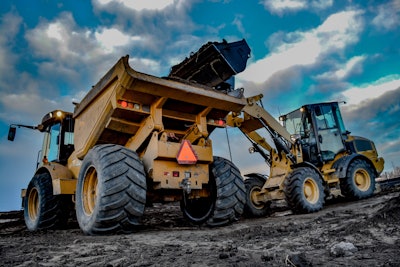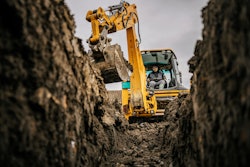
Of the many interdependent segments that make up the construction industry, few are as strongly correlated as contractors and heavy equipment. When contractors thrive, they expand and require more equipment, driving the demand for heavy machinery. However, the flip side is that contractor failures may equally impact the heavy equipment business. This means a portion of all heavy equipment entering the used market potentially have liens.
One significant issue is that equipment liens stay with the machine regardless of who owns it. Liens are not directly filed against the machine but against the seller, whether they operate as a business or an individual. This means you can’t search for liens using machine details such as make, serial number, or VIN. Sometimes, a seller's lien might not specifically mention the machine, but blanket all assets, which still legally allows repossession of the asset. These facts make the process of dealing with heavy equipment liens challenging.
Taking a step back to look at the bigger picture, 65% of contractors fail within 10 years, according to the U.S. Bureau of Labor Statistics (2024). Despite this, it's relatively easy to enter the market due to factors like grants from trade unions, upfront payments from contracts, borrowing against assets, and leveraging profits from other jobs. While these help facilitate growth, they can also lead to overextension without careful planning.
Many contractors look profitable but may be operating at a loss due to inaccurate financial projections and outdated pricing. However, new contractors continue to enter the market, contributing to its dynamism. Establishment of private specialty contractors has increased by 20% over the last decade. (U.S. Bureau of Labor Statistics, 2024). To put that in perspective, Q3 2013 to Q3 2023 shows an increase of 97,218 establishments. Of those, 58,330 have, or will fail.
This cycle for contractors has repeated for decades, and equipment procurement plays an important role. Contractors recognize the importance of equipment utilization, depreciation, ABL, ROI, and lifecycles, and use them to drive purchase decisions.
Now, let's dive into an interesting aspect of the story: liens. Unlike vehicles, which have a clear title indicating ownership and any existing liens, used heavy equipment lacks such straightforward documentation. However, the legal foundation for purchasing either remains the same: the responsibility for due diligence lies with the buyer.
When purchasing a used car from a private seller or broker, we inquire about the title: Do they possess it? Is it in their name? Are there liens recorded? When purchasing through reputable dealers, regulation assures we can expect clear title. But how does this process differ for heavy equipment? Unfortunately, there isn't a single document for the transaction; instead, it involves a series of steps. Liens on heavy equipment are filed and can be searched through the Uniform Commercial Code (UCC) overseen by each state's Secretary of State. While this may be common knowledge, the real challenge is fully understanding all steps and details to satisfy 'reasonable due diligence. Let’s revisit the used car discussion. It's widely understood that the buyer must require a clear title to protect their interest. But in the heavy equipment world, many buyers don't realize their responsibilities in the transaction process. For those who do, they may struggle understanding the steps to take, or will need to find someone who does.
Let’s review transaction dynamics:
Private Buyer to Private Seller
Current Industry Norm:
The buyer may verbally ask if there are any liens and request a copy of seller’s originating Bill of Sale to confirm ownership. Then they finalize the transaction by using a Bill of Sale.
If down the line, the seller's legal lienholder repossesses the asset, the buyer can attempt action against the seller or the repossessing entity. However, they will likely not succeed in court since they did not legally satisfy ‘Reasonable Due Diligence’.
Actual industry Requirement:
The purchaser should write down and get signed answers to three basic questions to stay safe:
Are you the legal owner?
Are there any liens?
What is your State of Incorporation (if business) or Residency?
Capturing this information at the very least creates a way for the buyer to take action against the seller if they don't reveal any liens, and repossession happens due to the unsatisfied lien. However, to fully comply with the law, the buyer needs to:
1. Visit the state of incorporation or residency that the seller has disclosed.
2. Verify their business registration (if a business).
3. Search Secretary of State (SOS) records for any UCC filings against the seller.
4. Review all filings and descriptions of collateral in the UCC filings.
a. Determine if the liens apply and are relevant to the equipment.
i. If so, obtain subordination from lienholders if necessary.
This summary simplifies the process, but there are still many details and nuances to understand and follow for correct execution.
Buyer Through Reseller Channels (Dealer, Auction & Brokers)
Current Industry Norm:
- Most buyers don't realize that the law expects them to either conduct due diligence themselves or ensure that the seller/reseller has done it properly.
- Reputable dealers usually carry out some level of due diligence to reduce risks before adding items to their inventory or selling them to customers.
- Auctions and brokers act as intermediaries and don't own the assets they sell. They often lack written documentation proving that the items they're selling are (or will be) free from liens.
- None of these entities are legally obligated to perform due diligence unless they explicitly offer it as a value-added service in their terms and conditions.
If the buyer didn't do their homework or ensure that their seller or reseller guaranteed a lien-free asset, and the machine gets repossessed by the seller's legal lienholder, the buyer does not have legal standing take action against any parties. Unless the seller/reseller steps in to help, the buyer may lose their investment.
When buyers finance an asset, they get some protection. Many finance companies check for liens to protect themselves. If the finance company partners with a reseller, they usually have provisions in their agreements allowing them to seek recourse from the reseller in the event of a repossession. But this only covers their exposure. Example: Lien was missed, and the asset is repossessed. Buyer initially purchased FMV of $75,000, put down $15,000, and have made multiple payments. The finance company will use agreement clauses to recoup what is left on the loan from the reseller. However, the buyer will likely lose their investment in the item.
Actual industry Requirement:
The buyer needs to ensure that their reseller officially confirms items are 'Lien Free' or will be soon after the sale. This allows time for the proceeds to be disbursed and the lien to be satisfied. Paying attention to the contract language is crucial because many Terms and Conditions state they can be changed without notice. Checking this confirms that proper due diligence has been carried out and provides a way to seek recourse if needed.
Let's drive this home with an example:
John Doe starts a contracting business and buys new equipment. After five years, he pays off his initial equipment loans. To grow, he secures a $1 million line of credit from his bank based on his financials and asset equity. The bank requires approval for asset sales and can demand repayment at any time.
In the sixth year, John sells an asset without notice. He submits his tax returns and asset list to the bank, and they adjust his credit line based on his finances. The seventh year brings financial stress, and he *lists/sells two older pieces of equipment without informing the bank. John is legally obliged to inform the bank before selling these units, which he didn't do. However, John is not legally required to disclose any liens to other parties.
Scenario One: *Lists
The lienholder discovers the list of assets for sale and sends a cease and desist to halt the sale or sets a minimum dollar requirement to release their lien. If the reseller can't meet the lienholder's amount, they'll need to cancel the listing. Depending on the contract terms, the reseller might seek reimbursement for listing costs from John.
Scenario Two: *Sells
John sells his assets to cover his immediate needs. The buyers don't check if any due diligence was done by John or their reseller. As the economy weakens, and lenders tighten their requirements, John faces financial difficulties. Unlike the previous year, when the lender reviews submitted financials and finds assets missing, they demand John pay a specific amount to balance his line of credit, or require the LOC be paid in full. This may force John to close shop. If John doesn't file bankruptcy promptly (and many contractors do not), the lender can legally repossess sold assets from whoever has them.
These incidents are uncommon when the economy is strong, but they can become more common during downturns. Additionally, advancements in AI technology used by lienholders to detect unauthorized listings may increase their frequency.
Given the cyclical nature of construction, it's crucial to understand the legal aspects of liens and take necessary precautions. Both buyers and sellers need to know their responsibilities to prevent legal and financial issues. Having protective measures (such as a vetted lien process or experienced lien service provider) can help lessen the probability of a monetary consequence, and damage to your professional reputation.
References:
1. U.S. Bureau of Labor Statistics. “TED: The Economic Daily” January 12, 2024. https://www.bls.gov/opub/ted/2024/34-7-percent-of-business-establishments-born-in-2013-were-still-operating-in-2023.htm
2. U.S. Bureau of Labor Statistics. “Databases, Tables & Calculators by Subject- NAICS 238- Specialty Trade Contractors- Private” https://data.bls.gov/timeseries/ENUUS000205238?amp%253bdata_tool=XGtable&output_view=data&include_graphs=true



















